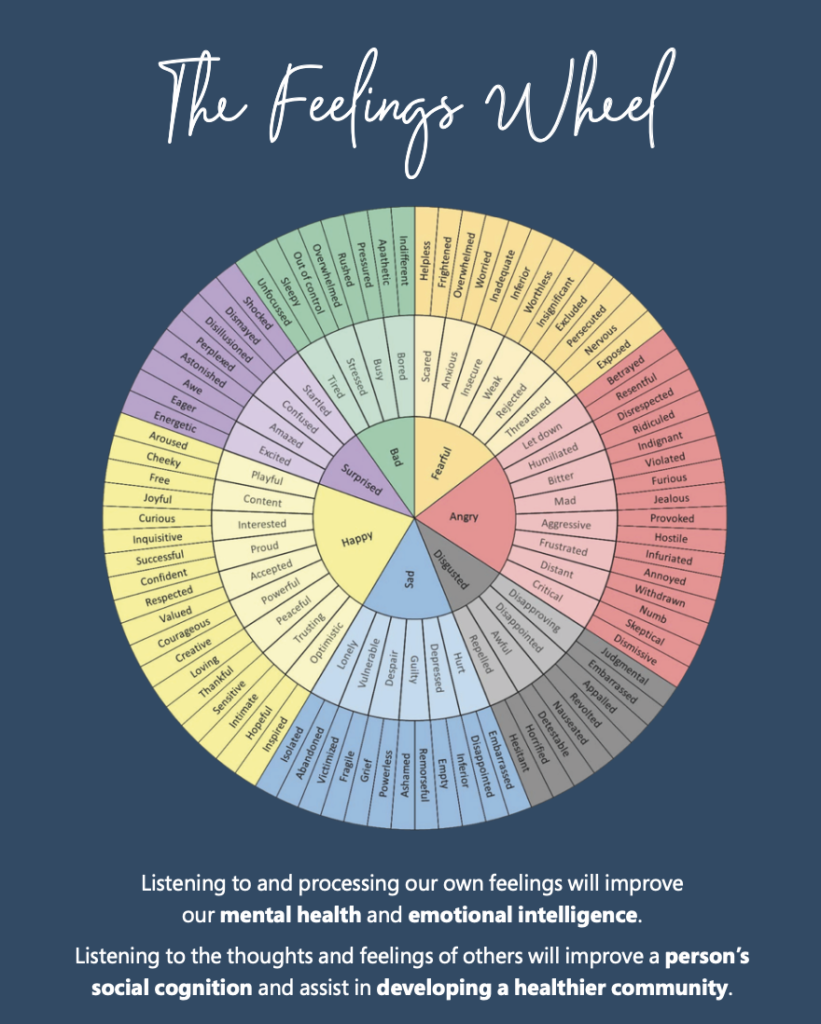At Transformations, our mission is to guide individuals on their journey to overcoming addiction and achieving lasting recovery. A crucial aspect of this journey involves understanding and identifying your feelings. Emotions are powerful forces that influence our thoughts, behaviours, and overall mental health. The “Feelings Wheel” is a valuable tool that illustrates the vast spectrum of human emotions, highlighting the importance of emotional awareness and intelligence. In the context of addiction recovery, recognising and processing your feelings can make a significant difference in your healing journey.
Understanding the Feelings Wheel
The Feelings Wheel categories emotions into six primary groups: Happy, Sad, Angry, Disgusted, Bad, and Fearful. Each primary emotion branches out into more specific feelings, providing a detailed map of our emotional landscape. For example, the primary emotion “Sad” can include feelings like “Hurt,” “Depressed,” or “Guilty.” By using this tool, individuals can pinpoint their exact emotions, rather than relying on broad or vague terms. This precision is vital in understanding the root causes of emotional responses and behaviours.
The Role of Emotional Awareness in Addiction Recovery
1. Self-Awareness and Regulation: Identifying your feelings is the first step toward self-awareness. In addiction recovery, understanding your emotional triggers can help you manage and regulate your responses. When you can name your emotions, you can better address the underlying issues that may have contributed to substance abuse.
2. Building Emotional Intelligence: Emotional intelligence involves recognising, understanding, and managing our own emotions, as well as empathising with others. Enhancing emotional intelligence through the regular practice of identifying feelings can improve interpersonal relationships and foster a supportive recovery environment.
3. Coping Strategies: By recognising specific emotions, individuals can develop healthier coping strategies. Instead of turning to substances to numb feelings of anger, sadness, or fear, they can use constructive methods such as mindfulness, journaling, or talking with a therapist to process their emotions.
Consequences of Ignoring Your Feelings
When we ignore or suppress our feelings, it can lead to several negative outcomes:
1. Emotional Numbing: Continuously avoiding emotions can result in emotional numbness, where individuals become disconnected from their feelings altogether. This can hinder the recovery process and make it difficult to experience joy or fulfilment.
2. Increased Stress and Anxiety: Unprocessed emotions can build up over time, leading to heightened stress and anxiety. These unresolved feelings can act as triggers for relapse, making it crucial to address them promptly.
3. Physical Health Issues: Chronic stress and emotional suppression can manifest physically, causing issues such as headaches, digestive problems, or cardiovascular diseases. Maintaining emotional health is integral to overall well-being.
4. Strained Relationships: Difficulty in expressing and understanding emotions can strain relationships with loved ones. Effective communication and empathy are essential for rebuilding trust and fostering healthy connections during recovery.
Practical Steps to Identify and Process Your Feelings
1. Use the Feelings Wheel: Regularly refer to the Feelings Wheel to pinpoint your exact emotions. This practice can enhance your emotional vocabulary and awareness.
2. Mindfulness Practices: Engage in mindfulness techniques such as meditation, deep breathing, or body scans to tune into your emotional state.
3. Journaling: Write about your feelings daily. Journaling can help you process emotions and gain insights into your emotional patterns.
4. Therapy and Support Groups: Seek professional help through therapy or join support groups where you can share and explore your feelings in a safe environment.
5. Open Communication: Practice open and honest communication with trusted friends or family members. Sharing your feelings can provide relief and strengthen your support network.
At Transformations, we believe that identifying and processing emotions is a cornerstone of successful addiction recovery. By fostering emotional awareness, individuals can navigate their recovery journey with greater resilience and clarity, ultimately leading to a healthier, more fulfilling life.

